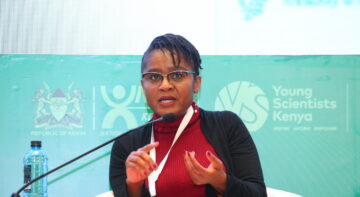News

A group of staff from the Kenya Parliament graduated today in Nairobi after completing a course on the use of research and other information in decision-making. The ceremony was presided over by Hon. Dr. Susan Musyoka, MP for Machakos County and the Chairperson of the Parliamentary Caucus on Evidence-Informed Oversight and Decision-Making (PC-EIDM).
The training on the use of research and other information in decision-making, dubbed evidence-informed decision-making (EIDM), was critical to strengthen the current weak capacity among parliament staff in finding research and other information or evidence, assessing its credibility, synthesizing a wide range of information, and packaging this information appropriately for ease of use by members of parliament. The weak capacity was revealed by a study conducted in 2014, whose findings informed the design of this training course.
The training course was designed and delivered by the African Institute for Development Policy (AFIDEP), FHI360 and other partners under the Strengthening Capacity to Use Research Evidence in Health Policy (SECURE Health).
As part of the training, the staff developed evidence briefs responding to issues of interest to the parliamentary committees they support. The staff who completed their evidence briefs presented the key findings and recommendations for tackling the issues at the graduation ceremony today.
Speaking at the ceremony, Hon. Musyoka noted that time had come for the Kenya Parliament to take deliberate measures to strengthen its ability to meaningfully use research to formulate legislation and generally enhance its effectiveness in addressing the needs of citizens. Commenting the staff who had presented their briefs, she said, “I have seen quality, I have seen content and today I have witnessed the work of policy experts in parliament who will help us to raise the quality of debate, laws and policies made by members of parliament by ensuring that they are informed by evidence.”
Speaking during the occasion, AFIDEP’s Director of Science Communications and Evidence Uptake, Dr. Rose Oronje, noted that the graduation ceremony was not an end in itself. “The success of this training programme is not this graduation ceremony; rather the success of this programme will be seen in improved use of evidence and quality debate and decision-making in the Kenyan Parliament,” she said. She noted that AFIDEP has worked with the Kenya Parliament to build both the institutional and individual capacity in order to bring about a behaviour and culture change in regard to evidence use in decision-making. “We hope that those who graduated today will continue championing of evidence use in the Kenyan Parliament,” she concluded.
On his part, the head of Parliament Research Services, Mr. Bonnie Mathooko, underscored the urgency to build Parliament’s capacity to use evidence. This capacity, he noted, would serve any area of legislation or policy because skills to mine, synthesise and package evidence apply across the different sectors of development. “Our society has become more knowledgeable in the information age. We therefore cannot afford to make ill-informed policies because citizens are now very enlightened and doing so would raise their concern.”
He noted that since the research unit in Parliament serves both the National Assembly and the Senate, technical staff charged with the task of developing policies need special skills in order to tap into research and other types of evidence to ensure that deliberations within specialised committees of the two houses are well-informed.
The SECURE Health programme, also implemented in Malawi, is run in collaboration with the Parliament of Kenya by a group of organisations including the Consortium for National Health Research (CNHR), FHI 360 and the East, Central and Southern African Health Community (ECSA-HC). The programme is funded by the UK government’s Department for International Development (DFID).
Related Posts





